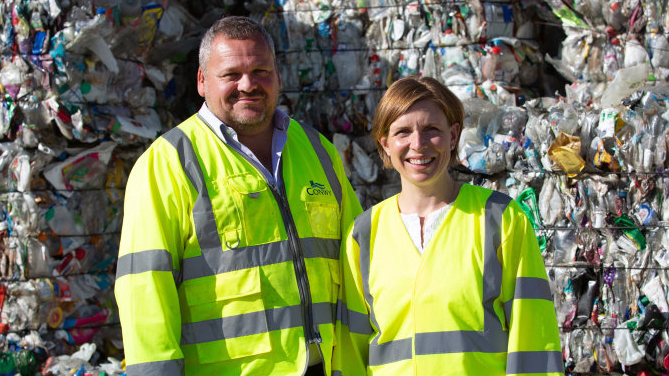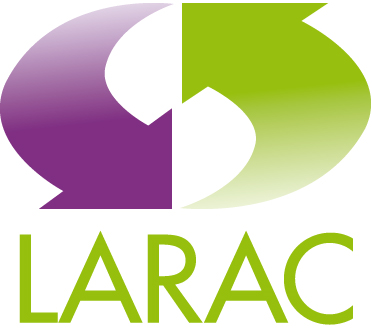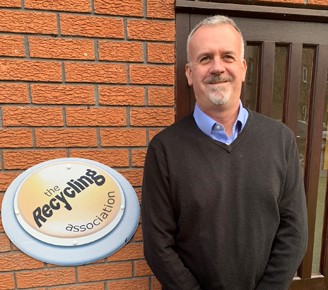Headline policy proposals include the removal of the £1 billion plans by Defra (the Department for Environment, Food and Rural Affairs) for the collection of business waste packaging, the introducing of kerbside film collections by 2027 and a continuation of the current PRN system.
We’ll bring you the latest reactions as they come in below.
If you’d like to contribute, please email us at: news@letsrecycle.com.
Polytag welcomes ‘open door’ for digital solutions
Polytag, the company behind a ‘digital DRS’, has welcomed the responses and that Defra has “left the door wide open” for a digital solution to the plans.
Alice Rackley, CEO of Polytag, said: “The published government response is a definite step in the right direction, with EPR due to be implemented in a phased manner from 2024 – but with requirements for businesses to start collating data from 2023.

“However, clear inconsistencies in the approach to delivering EPR across the devolved nations raises questions. In particular, deposit return schemes operating with glass in-scope for Wales but out of scope in the other countries.
“Pleasingly, the government response leaves the door wide open for digital solutions that can help automate the various processes that are being proposed, particularly when it comes to reporting and sampling, and potentially digitising mandatory on-pack recycling labels”.
Labour MP slams DRS plans

The Labour MP for Bradford, Mohammed Yasin, has slammed the government for removing glass from the DRS plans.
Defra confirmed in its consultation response that the material wouldn’t be included in a DRS in England and Northern Ireland. Wales had confirmed an ‘all-in’ system while Scotland is keeping it under review.
Mr Yasin said: “The government’s U-turn on glass is nothing short of astonishing and, worse yet, is disastrous for the environment.
“We’ve seen how a deposit return scheme can be a game-changing device in tackling waste from drinks containers, but the scheme’s current design falls well short of what is needed.
“The government made a promise to voters that it would introduce a DRS which will combat litter stemming from plastic and glass containers, but now they are breaking that. If we want a best in class scheme, then they must backtrack on this latest U-turn.”
Mr Yasin’s comments came as part of a release including statements from A Plastic Planet co-founder Sian Sutherland, and wildlife protection and animal welfare campaigner Dominic Dyer, who were highly critical of the move to remove glass.
ADEPT has ‘number of concerns’
The Association of Directors of Environment, Economy, Planning and Transport (ADEPT) has “broadly welcomed” the government’s approach to EPR but has several concerns around the ongoing delays to the DRS and the consistency in recycling policy.
It is also concerned that local authorities cannot bear any further additional costs to implement new schemes and would like to see far more clarity on how these are to be funded.
Steve Read, chair of ADEPT’s environment board said: “We urge Defra to release the response to the DRS and Consistency in Household and Business Recycling consultations as soon after the local government elections in May as possible. This is stymieing investment in both collection and processing infrastructure.”

And, Steve Palfrey, chair of ADEPT’s waste group added: “While ADEPT largely support the approach to EPR, we have a number of concerns with the indicated approach to consistency in recycling collections and the introduction of DRS.
“The response suggests that there may not be additional ongoing revenue funding for the new duties around consistency of collection, and that EPR payments will be used to subsidise wider household waste collections, rather than providing new funding to support the collection of packaging and for service development.
“Furthermore, while we welcome the fact that glass collections will be outside the remit of DRS in England and Wales, we are still waiting for enough detail to understand what this will look like. ADEPT remains concerned that a DRS is an expensive way to make marginal improvements in recovery rates for plastic bottles and cans.”
Producer group hails ‘pragmatic approach’
The Food and Drink Federation (FDF), whose members include Alpro, Associated British Food and Cadbury, was full of praise for Defra after the publication of the EPR responses.

Karen Betts, chief executive of the federation, said: “We’re pleased the UK Government has proposed a constructive and pragmatic approach to EPR, which will impose changes on how manufacturers approach packaging our products.
“We welcome the UK Government’s flexibility as the measures have been drawn up, including further discussion on business waste, which would impose disproportionate costs on businesses, as well as the obligation on industry to pay for illegal littering, a decision which we hope the devolved administrations will also adopt.
“Food and drink manufacturers will continue to engage with UK and devolved governments on the remaining elements of EPR, including the establishment of the Scheme Administrator and implementing the related chemical recycling process.”
British Glass pleased glass excluded from DRS
While the announcement was largely focused on EPR, it included some details on the DRS as well.

The consultation document said that England and Northern Ireland will not include glass in their DRS. Instead, glass drinks bottles will be in scope of EPR, which will place targets on producers.
The association’s chief executive, David Dalton, said: “British Glass welcomes the decision by Defra and the Northern Ireland Executive to keep glass out of the proposed deposit return scheme in England and Northern Ireland. Ensuring that glass is recycled through an effective kerbside system, coupled with the introduction of extended producer responsibility, is absolutely the right way to improve glass recycling rates and reduce carbon emissions.
“We very much look forward to working with government to make extended producer responsibility a success for glass packaging, helping to meet the UK’s rightly ambitious environmental targets.”
Mixed reaction from LARAC
The Local Authority Recycling Advisory Committee (LARAC) has said while it would have liked all consultations to be published together, the publication of EPR responses “is some progress”.

On business waste, LARAC said the decision to remove it will mean some businesses will continue to make “no effort to recycle”. It also said business waste is a key element of the UK hitting a 65% recycling target by 2035.
On film, which now needs to be collected by 2027, LARAc said “we don’t know what collection system(s) will be legally compliant as there is no information yet on what consistency will be, so we don’t know how the material will be made available to the market”.
The committee also questioned if Defra is accepting the “off-shoring” of the material given the lack of infrastructure to process it.
On timelines, LARAC added that Defra is “lacking in detailed data to design the payment mechanism or set fee levels, yet local authorities are expected to begin changing their collections and tender contracts in this period of uncertainty”.
However, LARAC is pleased to see that some of the “wants” in our response to the second consultation will be taken forward: the scheme administrator to be a single body; the mandated take back of disposable paper cups by retailers; and a single scheme for recycling logos with a “can be recycled” OR “can’t be recycled”.
Wastepack: ‘An enhanced PRN system make sense’
Compliance specialist Wastepack said that keeping the PRN system is the most “sensible approach” to take and along with some of the measures proposed in the PRN reforms consultation will ensure that the system will be robust enough to help underpin EPR, “just as it has done with the current system for the past 25 years”.

Paul Van Danzig, policy director at the Wastepack group said: “We are delighted that after many months of meetings with Defra and other stakeholders, the government has listened to our concerns and proposals and has decided that an enhanced PRN system is the best approach to take to ensure that recycling is adequately funded in the UK”
Van Danzig also stated that having a scheme administrator overseen and operated by the public sector is absolutely the right thing to do. “We have always been concerned with proposals that seemed to give a lot of powers to a commercial entity. It makes sense that the scheme administrator is owned and operated by the Government as this will ensure that it won’t be subjected to the commercial pressures it could have faced, should it have been owned by the private sector”.
Recycling Association breathing ‘sigh of relief’
The Recycling Association’s statement also highlighted its relief that Defra has dropped its plans on business waste.
Simon Ellin, the association’s chief executive, also said he was pleased the PRN system was being retained and the fact the scheme administrator is to be in the public sector.

Mr Ellin said: “Our Members will be breathing a sigh of relief this morning that their businesses and the jobs they create would not be ended by government policy.
“The decision to set up a taskforce to look at how business waste collection can be funded by EPR is a sensible one, and a timescale of up to 2026/7 gives plenty of opportunity to come up with good proposals.
“For those that export, the proposals look like ones we can work with. It remains disappointing that there is no aim to introduce maximum contamination limits so that exporters know the criteria to operate legally, rather than the uncertainty we have now.
“However, we support the idea of the UK moving to end-of-waste for fibre and we hope that this can be incorporated into EPR.
“However, with the Consistency of Collections and Deposit Return Scheme responses not published yet, the devil will be in the detail when it comes to the overall bigger picture”.
CIWM concern on ‘watered down’ EPR proposals
The Chartered Institution of Wastes Management (CIWM) has expressed concern that the proposals have been “watered down” to the point that the system will “not be as effective”.
Lee Marshall, policy and external affairs director at the CIWM, said the “diluted” proposals means the UK is in danger of “taking longer to move a to world beyond waste”.

The CIWM set out a number of frustrations, including:
- CIWM is surprised at the decision by Defra to reduce litter payments for packaging to material in bins and not for ground litter
- CIWM supported the move to decrease the de-minimis at which organisations would be obligated by the EPR requirements and feels that the intention not to do that is a missed opportunity
- CIWM is also frustrated at the news that the Scheme Administrator is to be classed as a public body
Mr Marshall said: “It is frustrating that it has taken this long and the fact we still do not have the responses to the DRS and consistent collections consultations is not ideal in trying to consider these key changes in the round. Irrespective of this, the government’s response to the consultations certainly appears to have diluted the original intention for producer responsibility for packing in the UK. This will make achieving net zero that bit harder and means the UK is in danger of taking longer to move a to world beyond waste”.
Ecosurety hails retention of PRN system

Robbie Staniforth, innovation and policy director at Ecosurety, echoed previous sentiment that Defra has taken a “pragmatic approach”, adding that the rention of the PRN system can “have a direct impact on recycling.
He said: “The summary shows that UK Governments have taken a pragmatic approach to improving the packaging recycling system in the UK. The incentive to recycle for packaging reprocessors has been retained for the immediate future ensuring that producers of packaging can have a direct impact on recycling.
“We hope that the modifications to the PRN system outlined in the accompanying consultation will drastically improve the current system and lead to higher recycling rates in the UK.”
UROC ‘exceptionally pleased’
The trade association for independent waste and resource operators, UROC, has said it is pleased the government has “listened to the sector” on business waste plans.

UROC has been a vocal critic of the plans and said they pose an “existential threat” to some operators.
The association’s chief executive, Jennifer Watts, said: “UROC led the debate around business payments for EPR given the significant impact it would have on members providing commercial waste collections.
“Bringing together over 40 stakeholders for informal discussions around EPR business payments and an enormous amount of work feeding into Defra and the devolved administrations raising industry concerns and presenting alternative models. UROC is pleased that government has listened to the sector and decided to delay the introduction to allow further discussions which will inform the formal review in 2026.
“UROC has always maintained that implementation of consistency of collections should facilitate increased and better recycling of business waste. We are exceptionally pleased and relieved that the whole system is not going to be turned on its head. We are grateful to all members who inputted into the discussions”.
Hayler backs move to drop business waste

Jake Hayler says Defra’s decision to drop business waste is sensible and welcomed the fact the focus will be on “implementing and assessing the regime first”.
Executive director of the Environmental Services Association (ESA), Jacob Hayler, said: “A new and properly functioning EPR regime is key to unlocking greater recycling and more resource-efficient packaging formats in the UK, and we welcome the greater clarity that Defra’s response to the last round of consultations now brings.
“Although essential in the long term to meeting recycling targets, managing payments to businesses for the household-like packaging waste they collect has been among the most contentious and complex areas to design within this new regime and a desirable solution that works for all parties has yet to be found. We are therefore pleased to see Defra focus on implementing and assessing the regime first before any introduction of business waste payments, which will be subject to the work of a dedicated task-force”.
Trigg-Knight welcomes ‘pragmatic approach’
Martin Trigg-Knight, head of compliance at Clarity Environmental and a member of the ACP welcomed the response summary and the “pragmatic approach” to implementing EPR Defra has taken.

He said: “With the costs for producers now set to be £1.7 billion pounds, the delay in introducing EPR will hopefully relieve some of the pressures businesses are currently facing. Defra’s approach to ensuring that recycling infrastructure is still funded through the PRN system was also welcomed and will now give reprocessors the confidence to make the investments necessary to ensure that EPR delivers an even better UK recycling capability.











Subscribe for free